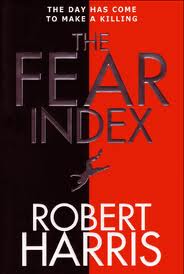Robert Harris
Alfred A. Knopf

|
A trillion dollars of assets was controlled from Geneva … Dollars, euros, francs—these were the units in which [Hoffmann] measured the success or failure of his experiment, just as at CERN he had used teraelectronvolts, nanoseconds and microjules. However, there was one great difference between the two, he was obliged to concede; a problem he had never fully confronted or solved. You couldn’t buy anything with a nanosecond or microjule, whereas money was a sort of toxic by-product of his research. Sometimes he felt it was poisoning him inch by inch, just like Marie Curie had been killed by radiation. from The Fear Index |
Be afraid. Be very afraid.
“Our conclusion is that fear is driving the world as never before,” Dr. Alexander Hoffmann tells his investors. A brilliant physicist who formerly worked for CERN (the European nuclear research agency in Switzerland), Hoffmann has learned to turn fear into money.
He did this did this by creating VIXAL-4, “an autonomous machine-learning algorithm”; more specifically, it is a cyber program that monitors the level of fear on the Internet and then makes lightning–speed hedge fund transactions based on its “fear index.” A small mid-European airline’s plane crashes and VIXAL-4 has traded its stock before the fireball is even extinguished.
Robert Harris, the author of a number of smart political and historical thrillers (The Ghost, Fatherland, Enigma, Pompeii) has written a novel that is as timely and prescient as tomorrow’s news.
The reader becomes immersed in the world of high finance and hedge fund trading where people talk blithely in terms of billions, even trillions of dollars (millions is just so yesterday.)
Yet, although having accumulated a fortune using his algorithm, Hoffmann himself cares little for money and openly despises his billionaire clients, the very rich who want to become even richer yet whine about the tax rates in Europe. It is his research into Autonomous Machine Reasoning (also called Artificial Intelligence) that is his passion.
Then, just as Hoffmann Investment Technologies is set to become the largest algorithmic hedge fund in the world, something begins to go awry. Instructions, invitations and expensive orders are sent from his email address that Hoffmann never sent. Or did he? We learn that he has a past history of mental instability.
He believes that the firm’s ultra-tech security system has been hacked into, and whoever is doing it is trying to sabotage his company, his career, and his marriage. Oh, yes—and they may also be causing a collapse of the global economy.
Deserving his bestseller status, Harris writes in a taut, fast-paced style that also presents ideas and issues that will cause the reader to think about the real-world implications of what he or she is reading.
The Fear Index is a thriller for thinking adults. And if you manage a stock portfolio, you may choose to sleep with the lights on after reading this book.
This review first appeared in The Columbia River Reader (May 15-June 14, 2012.) Reprinted with permission.



